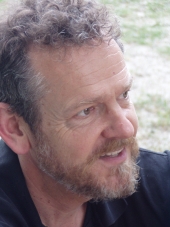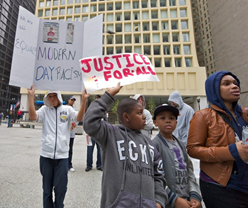“If you have a new world, you need a new church. You have a new world.” (Brian McLaren, The Church on the Other Side)
Many years ago I sent an essay on the crisis in the church to the Editor of Christian Century. He returned it with the comment, “That Christianity faces overwhelming challenges today is not news. We’re interested in solutions.”
This blog series is about the solutions. Too many, from top denominational leaders to people in the pews, still seem paralyzed by the problems. Fixated on crises, we fail to notice that people all around us are reinventing Christianity. Inspired by Jesus’ radical way of compassion, inspired by their experiences of grace, inspired by a redemptive community, inspired by initiatives that bridge differences — whatever their reasons — they are galvanized to action. Collective action: people are coming together to do the things that they know and believe to be right, to be the change they wish to see in the world. New networks are coming together — locally, regionally, and nationally.
It’s time now to draw attention to this emerging network of networks, this rapidly growing web of communities and collective action. Let’s call it a Collective Action Network of America. CANA — not a bad acronym. It calls forth the vision of the Promised Land, but also the town where Jesus did his first miracle. Let’s turn the bitter waters of discord and dissent into the fragrant wine of new partnerships.
This CANA Initiative is not about founding a new organization. It’s not about drawing attention here. Instead, it’s about using “here” as a way to draw your attention to what’s going on out there, all around the country (and beyond). So we’ll be featuring not ourselves but those who are out there experimenting, trying new things. The many leaders and activists who have committed to write over the coming weeks, sharing their work with you, come from dozens of different organizations, from across the theological spectrum, from all colors and cultures, from all age groups.
Generous Christianity
To be a Christian in a generously orthodox way is not to claim to have the truth captured, stuffed, and mounted on the wall. It is rather to be in a loving community of people who are seeking the truth on the road of mission and who have been launched on the quest by Jesus, who, with us, guides us still. (Brian McLaren, A Generous Orthodoxy)
It’s all too easy to name the problems, the qualities we don’t like in Christians and in the church: Intolerant. Divisive. Exclusivistic. Close-minded. Backward-looking. Dogmatic. It’s human, all too human, to see the negatives and fall into complaining … and from there into name-calling.
To name the positive that we aspire toward — that’s a harder task. One by one, it seems, the positive-sounding labels that have been proposed have been co-opted. People have narrowed each one down until it too, like its predecessors, becomes divisive and exclusive: Liberal. Progressive. Missional. Emergent. As Peter Matthews put it recently, most of the labels sound white, wasp-ish, and elite — more like Pier One than like WalMart. We need a name with a broader appeal, a label that does not name a camp.
We need a generous Christianity … and generous Christians.
Belief beyond the Labels
A national movement is afoot. It is, as Hal Knight puts it, “diverse and decentralized, averse to static structures and fixed ideas.” It’s a conversation. It’s new communities and new modes of worship. Above all, it’s new and powerful forms of collective action.
As the age of the Baby Boomers passes, a new kind of Christianity begins to emerge: One that many are calling “post-institutional.” One that draws on traditional practices but has little interest in the “-ism’s” of the past. One that doesn’t divide the world up into Liberals versus Conservatives. Above all, one that refuses to define Christianity by who it excludes, whether it’s their religion or their sexual orientation.
Just Do It
[The gospel] is a truth that has been flattened, trivialized, and rendered inane. Partly, the gospel is simply an old habit among us, neither valued nor questioned. (Walter Brueggemann, “Poetry in a Prose-Flattened World,” in Finally Comes the Poet)
In the age of technology and social networking — the first time humans have ever been genuinely global— many of the old institutions and beliefs are collapsing. Many more will bite the dust before it’s over. And yet, in this brave new world, the Jesus who wandered the highways and byways of the Holy Land remains amazingly relevant.
Blogs all over the internet promise to give you The Answer. By contrast, we’ll tell you up front that we don’t have any final answers. We don’t know the truth about God and Everything. But we will tell you what people across America are doing as they seek to respond to the needs of the people around them. You’ll see faith in action — people for whom faith means embracing rather than repulsing, accepting rather than rejecting. To us, this is “church,” a kind of church worth having.
Join the conversation. Blog your responses. Send us your own stories ([email protected]). Above all, find ways to live radical compassion in the world around you —in your own ways and for your own context. The world is undergoing change at a pace more rapid than the planet has ever seen before. It’s a time for bold innovators and courageous leaders, a time for cultural creatives and experimenters. Cana is just over the horizon — let’s give everything we have to live, in faith, for values that matter.
 Philip Clayton teaches and dreams, writes and leads conferences on vibrant forms of faith that are responsive to the radically transformed and transforming world we live in today. Learn more about Philip.
Philip Clayton teaches and dreams, writes and leads conferences on vibrant forms of faith that are responsive to the radically transformed and transforming world we live in today. Learn more about Philip.














